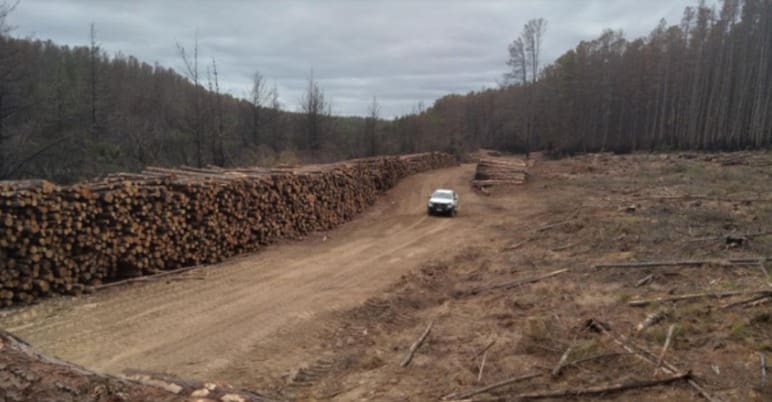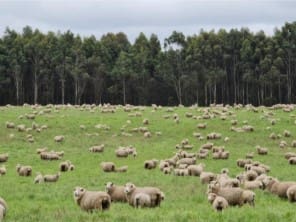
Fire-damaged logs harvested by Kiland awaiting export. Picture – Kiland.
FORMER Kangaroo Island forestry company Kiland is planning to convert its bushfire-ravaged tree crop estate to livestock grazing to sustain a 270,000 dry sheep equivalent capacity by 2026.
If achieved, this would potentially increase the island’s flock by 50 percent despite the SA Forestry Products Association calling for the planting of 50 million trees in the next four years to address industry shortages in South Australia.
In August last year the company, then known as Kangaroo Island Plantation Timber, announced its plan to walk away from the forestry industry after its proposal to build a $40 million port at Smith Bay on the island’s north coast was rejected by the State Government.
Since then, KIPT has changed its name to Kiland, bought back 10,204,133 ordinary shares at $1.26/share and welcomed new chief executive officer James Davies.

Crossbred prime lamb mothers on AAGIM-remediated land in western Victoria, with blue gum plantations in the background. Image – AAGIM/Kiland.
It also appointed AAGIM Investment Management to develop its KI land into “a top tier institutional-grade agricultural estate.”
In a non-renounceable rights issue investor presentation on Tuesday, the listed plantation timber company said it had undertaken an underwritten equity raising of $32.4 million through an accelerated non-renewable entitlement offer to fund the reversion strategy.
The presentation document said Kiland currently has about 14,433 hectares under plantation forestry “the overwhelming majority of which was severely impacted by fire in early 2020 and is uncommercial.” There are a further 4229 hectares of arable land and 6932 hectares of native vegetation. As KIPT, the company received more than $60 million in insurance compensation payouts following the fires.
“Upon consideration and consultation with AAGIM, the board has determined to undertake a more capital intensive reversion strategy focused on high-intensity sheep meat production,” the company said.
Kiland announced on Wednesday that the institutional component of the entitlement offer was successfully completed on 30 March and raised about $27.7 million. A retail entitlement offer anticipated to open on 5 April 2022 is expected to raise about $7.7 million.
The company is also discussing long-term funding of about $50 million from Australian banks to support its reversion activities.
Primary Industries and Regions South Australia has estimated sheep stock losses from the Kangaroo Island fires at more than 51,000 – almost 10 percent of the island’s pre-fire flock of 600,000.
The Kangaroo Island fires began on December 20, 2019, and burnt 210,000ha – almost half of the island – across a 612-kilometre perimeter before being declared contained on January 21, 2020.
Kiland has estimated that since 2008, about 250,000 hectares of Australian forestry land has been reverted to agriculture, including more than 100,000 hectares by AAGIM.
Kiland’s expected remediation timeline lists harvesting and grinding of trees, land preparation, livestock water and fencing to be completed by 2025. The company estimates its estate will have a DSE capacity of 55,000 next year, 125,000 by 2024, 213,000 in 2023 and 270,000 by 2026. It has estimated this can be achieved at a cost of $425/DSE.
The company has valued its land at $50 million and estimates further land development costs of $65 million and additional costs of $26 million for heavy machinery, stock and initial operating expenses associated with the sheep meat enterprise establishment.



Fantastic, we had a place where carbon sequestering occurred and now we’re replacing it with a major methane producing facility. Never mind the additional fertilisers and pesticides which will flow into the pristine waters surrounding Kangaroo Island. A step in the wrong direction.